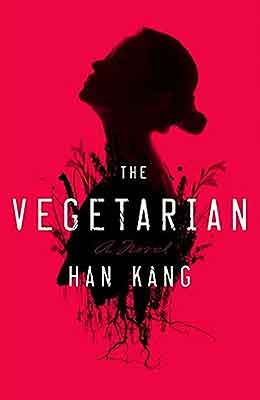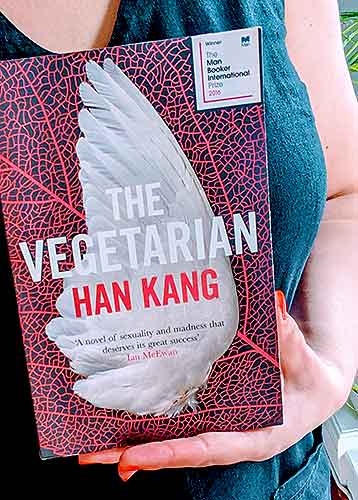 By HAN KANG (Hogarth; 2007/15)
By HAN KANG (Hogarth; 2007/15)
The more literarily inclined among you may recall this novel, translated from the Korean, receiving some (minor) attention upon its 2016 publication in America. THE VEGETARIAN certainly a unique creation, at once a Kafkaesque horror story, a naturalistic family saga and a brutal critique of social norms in South Korea, contained in an admirably brief, padding-free whole that leaves a haunting impression.
…at once a Kafkaesque horror story, a naturalistic family saga and a brutal critique of social norms in South Korea…
It begins with Yeong-hye, a young woman who’s apparently “unremarkable in every way,” suddenly turning vegetarian. This drastic act is precipitated by a nightmare involving mass bloodletting and a dark wood, the first, it turns out, of many disquieting dreams—dreams that come to encompass Yeong-hye’s not-entirely placid upbringing and her own propensity for violence. The result in a complete revulsion for all things meat-based, and eventually food of any sort, much to the consternation of her family members.
It begins with Yeong-hye, a young woman who’s apparently “unremarkable in every way,” suddenly turning vegetarian.
 It’s Yeong-hye’s loved ones who provide the novel’s three-pronged point of view, with brief italicized passages depicting Yeong-hye’s thoughts (which are quite disturbing). First we hear from her husband, an underachieving salaryman who, like everyone else in this scenario, is quite flummoxed by his wife’s decision to stop eating meat, mostly because it violates the traditions to which he and his extended family have become accustomed. This conflict culminates in a dinner party confrontation involving physical abuse and an attempted suicide (the first of several).
It’s Yeong-hye’s loved ones who provide the novel’s three-pronged point of view, with brief italicized passages depicting Yeong-hye’s thoughts (which are quite disturbing). First we hear from her husband, an underachieving salaryman who, like everyone else in this scenario, is quite flummoxed by his wife’s decision to stop eating meat, mostly because it violates the traditions to which he and his extended family have become accustomed. This conflict culminates in a dinner party confrontation involving physical abuse and an attempted suicide (the first of several).
We also hear from Yeong-hye’s brother-in-law, who finds himself unexpectedly aroused by her actions, and takes some pretty extreme measures himself. The final point of view is that of Yeong-hye’s sister, who is left to piece together the particulars of this twisted saga, and in the process confront her own troubled past.
Author Han Kang turns out to be an excellent guide through this odd and unpredictable psychoscape. Drafted in elegant and precise prose (and smoothly translated by Deborah Smith), the novel is extremely culturally specific in its depiction of post-millennium South Korea, yet the underlying issues it explores—familial dysfunction, conformity and personal obsession–are all quite universal.
